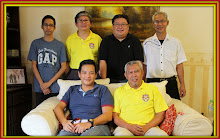22 April 2013, Kuala Lumpur – In anticipation of the upcoming Selangor Open 2013, here is another article by the late Lim Chong on his thoughts of the Selangor Open.
Selangor At Its Finest
By Lim Chong
One night after work in December 1978, I decided to go take a look at national individual chess championship which was being held in Petaling Jaya. Late at night, there were few spectators and sometimes they were outnumbered by the players.
Lew Chin Chuan and Laurence How, who were involved in organising the event, were the first two chess officials I met. Though I told them I was not on assignment, they were still pleased to see a reporter showing interest in the game.
The title that year was won by Christi Hon, with Jimmy Liew in second place and Peter Long third and the three of them went on to dominate the chess scene for many years.
From here I was introduced by Lew and How to the Chess Association of Selangor (CAS) and its activities, including its flagship tournament, the Selangor Open, which has the distinction of being the longest running chess event after having started in 1974.
Those who have participated in the Selangor Open would surely have found it an unforgettable experience. Having taken part in five events of the series, with the earliest in 1979 and the latest this year’s edition, they have all provided fond chess memories despite the poor results.
The Selangor Open provided an exciting opportunity for an enthusiast like me to play against top players like Liew, Tony Tay, Ahmad Muzzaffar Mustaffa and Chang Hing Wah, all of whom handed out valuable lessons in chess.
As well as women’s champion Audrey Wong at Selangor Open 1983 through a “surprise introduction” nicely arranged by How, who was the tournament director. I was one of those who lost to Audrey who was making her debut and at the end of the tournament, a star was born when she scored five points from nine rounds.
Audrey’s mother, Jackie Wong, was one of the hardworking officials who helped CAS to rise to the pinnacle. As a longtime secretary, her efficient and frugal approach saw the association having more members, more sponsors and more activities than ever before.
Even during the hard times, CAS somehow was always able to find the resources to carry on with its activities, including its junior training programme, that ensured that new generations of players kept coming up.
Despite difficulties in finding sponsors in recent years, current CAS secretary Lim Tse Pin is among those at the association who have managed to keep things going. He reported that last year’s Selangor Open suffered a loss of RM3,000 and this year’s event, even with 70 participants, is expected to incur a deficit of RM4,000.
The bad news continued with Lim warning that the tournament may be scrapped if CAS is unable to find a sponsor for next year. That would be a terrible loss for chess in this country. Though overshadowed in recent years by events like the Datuk Arthur Tan Malaysia Open and Kuala Lumpur Open in terms of international appeal, the Selangor Open has a unique tradition of its own, which evolved through the long years.
At the latest Selangor Open 2010, the final results saw four generations of players among the top four winners.
Liew, placed second, comes from the veterans, third-placed Kamal Ariffin Wahiddudin was the 1991 national champion, 11-year-old Yeoh Li Tian, who ended fourth, is considered among the most promising juniors, and champion Dr Nicholas Chan is currently the country’s strongest player without the international master title.
Also deserving mention is Penang coach Loo Swee Leong who should be commended for not just playing well to take the fifth spot but also for his effort in bringing down a group of schoolchildren to gain useful exposure in the tournament.
Chan was able to retain the title he had won last year but he still has a long way to catch up with Liew, an eight-time champion. The pivotal moment was in round five when both were paired against each other in their first ever meeting and Chan won with the white pieces.
Throughout the tournament, Chan was hardly troubled except for the eighth round when his opponent Ian Udani of the Philippines had a winning position but failed to convert and the result was a draw. Chan later admitted that he played badly in the opening but he was resourceful enough to fight hard to share the point, maintaining his unbeaten record.
At the rate Chan is progressing, it looks like a matter of time before he joins our small group of international masters if he is able to still find the time to continue playing.
For Liew, being the runner-up showed that he remains a force to be reckoned with. He was the one who ended the foreign domination at the Selangor Open by winning the title in 1980, marking a new era in the country’s chess development.
Liew went on to win the Selangor Open title eight times, a remarkable record that is unlikely to be broken, especially when he has shown that he is still capable of winning more.
The closest challenger is five-time winner Mok Tze Meng but he seems to be less active in tournaments after becoming an international master.
Many of us have gained in many ways from the Selangor Open which represents chess tradition at its finest. It would be surely be an immeasurable loss for all chess enthusiasts if such a tradition is not continued. So, see you at the 38th Selangor Open next year
